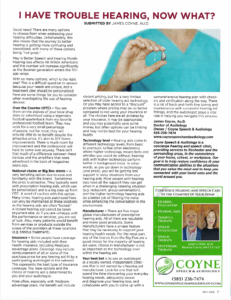Coyne Speech & Audiology published an article in the latest Brighton Connections in celebration of Better Speech & Hearing Month. See below for full text from the interview.

I HAVE TROUBLE HEARING, NOW WHAT?
Good news – there are many options to choose from when looking to address your hearing difficulties. Unfortunately, this also means that the journey to better hearing is getting more confusing and convoluted, with many of these options being “not great”.
May is Better Speech & Hearing month. Hearing loss affects 48 million Americans and this number with increase significantly as the Boomer generation enters the 70+ range.
With so many options, which is the right one? This is a difficult question to answer specifically, because your needs are unique and a treatment plan should be personalized. Here are some things for you to consider.
Over the Counter (OTC) – you see them on the shelves of your local drug store or advertised using a legendary football quarterback from my favorite professional football team. They may work for a very small percentage of people, but for most, they will provide little to no benefit despite the attractive price. It’s akin to the DIY home improvements I try. There is much room for improvement and the professional will have to come over anyway. There isn’t that much of a difference between these devices and the amplifiers that were advertised in the back of magazines years ago.
National chain or Big Box Store – a very tempting option due to ease and familiarity with the brand. Sometimes the price is attractive. They typically work with prescription hearing aids, which can be personalized and is a big step up from OTC. A word of caution with this option. Many times, hearing aids purchased here can only be maintained at these locations as the hearing aids are often “locked”. A locked hearing aid cannot be taken anywhere else, so if you are unhappy with the performance or services, you are out of luck. Also, many patients would benefit from services or products outside the scope of the providers at these locations (e.g. tinnitus treatment).
Insurance – some people have coverage for hearing aids included with their health insurance, including Medicare advantage plans. Coverage may include reimbursement of all or some of the purchase price for any hearing aid fit by a participating audiologist in the network. This represents the best type of insurance coverage. You have options and the choice of hearing aid is determined by you and your audiologist.
More often, especially with Medicare advantage plans, the benefit will include decent pricing, but for a very limited selection of older hearing aid technology. Or you may have access to a “discount” program where pricing may be no better compared to not using your insurance at all. The choices here are all dictated by your insurance. It may be appropriate, and you may potentially save some money, but more often options can be limiting and many not be best for your hearing health.
Technology level – hearing aids come in different technology levels, from basic to premium. Unlike other electronics, where higher technology means bells and whistles you could do without, hearing aids with higher technology perform better in background noise. In other words, as you go down in technology (and price), you will be getting less support in noisy situations from your hearing aids. Most people with hearing loss need all the support they can get when in a challenging listening situation (e.g. restaurant, group conversation), and the higher technology hearing aids do a better job of filtering the noise while enhancing the conversation in the environment.
Manufacturer – there are 5 major global manufacturers of prescription hearing aids. All of them are reputable and make good products. Some manufacturers have a unique feature that may be necessary to support your hearing health needs. For the most part, any of the brands from the big 5 are a good choice for the majority of hearing aid users. Choice in manufacturer is not as important as the technology level within the hearing aid.
Your best bet is to see an audiologist at a locally owned, independent clinic, one that is not owned by a hearing aid manufacturer. Especially one that will spend the time discovering your everyday hearing needs, adequately assess and diagnose your hearing loss, and collaborate with you to come up with a comprehensive hearing plan with check-ins and verification along the way. There is a lot of back-and-forth fine tuning and maintenance with successful hearing aid fittings, and the audiologist plays a vital role in helping you navigate this process.
James Coyne, Au.D.
Doctor of Audiology
Owner
Coyne Speech & Audiology is a concierge hearing and speech clinic, providing services to Rochester and the surrounding areas, in the convenience of your home, school, or workplace. Our goal is to help restore confidence in your communication abilities in the situations that you value the most and to keep you connected with your loved ones and the world around you.
